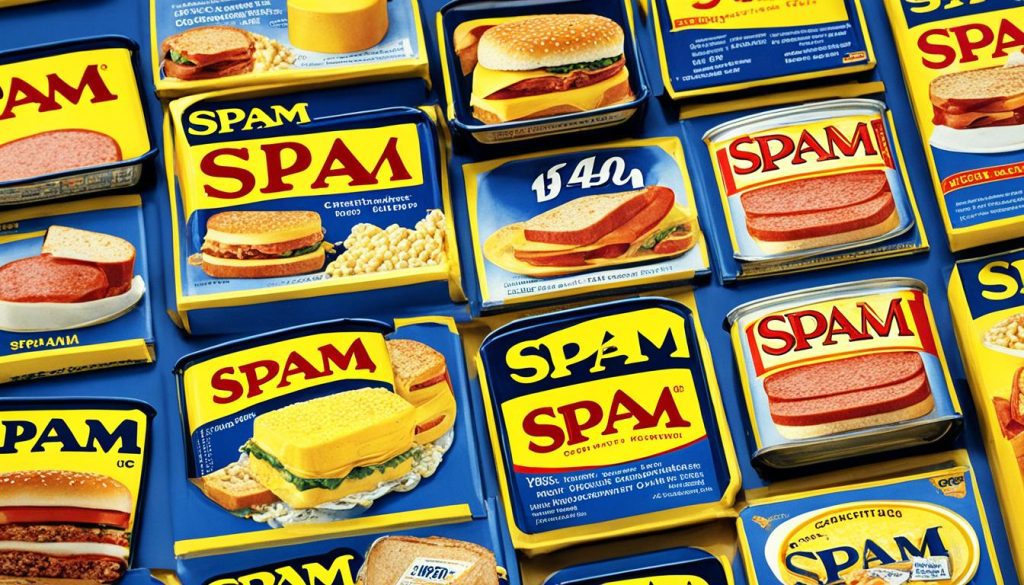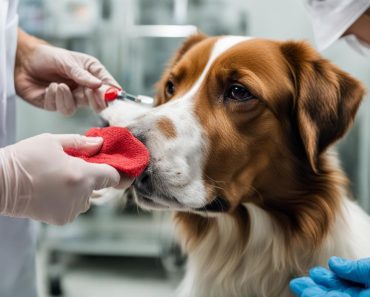Hello, fellow dog lovers! If you’ve ever wondered whether it’s safe for your furry friend to indulge in some of your favorite human foods, you’re not alone. Many pet owners have pondered the question: can dogs eat spam? In this article, we’ll explore the effects of spam on dogs and whether it should be a part of your pet’s diet.
Can Dogs Eat Spam? No, they shouldn’t. It is unhealthy and not safe.
- While dogs can physically consume spam, it may not be the healthiest option for them.
- Spam is high in sodium and fats, which can lead to health problems in dogs.
- Consulting with a veterinarian is the best way to determine your dog’s nutritional needs.
- There are healthier alternatives to spam that can provide essential nutrients for your dog.
- Transitioning to new treat options gradually and in moderation is essential.
Understanding the Canine Diet
Dogs have specific dietary needs that should be met for them to maintain optimal health. While they are primarily carnivores, they also require a balanced mix of proteins, fats, and carbohydrates in their diet. Proteins play a crucial role in supporting their muscular health, while fats help keep their skin and coats healthy. Carbohydrates, on the other hand, provide them with essential energy and fiber.
It’s important to note that not all human foods are suitable for dogs. Some can be harmful and cause health issues. To ensure your dog is getting a balanced diet, it’s crucial to understand their specific needs and provide them with appropriate food choices.
Incorporating a healthy diet for dogs means finding the right balance between proteins, fats, and carbohydrates. This balance helps meet the nutritional requirements of your dog and supports their overall well-being. A diet lacking in any of these components can lead to deficiencies and health problems.
Proteins
Proteins are essential for your dog’s diet, as they are the building blocks for their muscles. Good sources of proteins for dogs include lean meats, like chicken, turkey, and beef, as well as fish. These proteins help maintain healthy muscles and support their growth and repair.
Fats
Fats are another vital component of a dog’s diet. They provide a concentrated source of energy and help regulate body temperature. Additionally, fats contribute to maintaining healthy skin and a shiny coat. Some healthy fat sources for dogs include fish oil, flaxseed oil, and chicken fat.
Carbohydrates
Carbohydrates are a source of energy and provide fiber to support healthy digestion. Good sources of carbohydrates for dogs include whole grains, such as brown rice and oats, as well as fruits and vegetables.
It’s essential to note that each dog may have specific dietary needs based on factors like age, breed, size, and activity level. Consulting with a veterinarian can provide valuable insights and help you determine the appropriate balance of proteins, fats, and carbohydrates for your furry friend’s specific needs.
What is Spam?
Spam is a canned precooked meat product that has been enjoyed by many for decades. It gained popularity during World War II and continues to be a convenient and tasty option for meals today. Made from chopped pork shoulder meat, ham, salt, water, modified potato starch, sugar, and sodium nitrite, spam offers a unique flavor profile that appeals to various palates.
Despite its enduring popularity, it’s important to be aware of the nutritional content of spam. On closer inspection, spam is found to be high in sodium and fats, particularly saturated fat. This can be a concern for individuals who are watching their sodium intake or striving for a healthier diet.
Spam, like many processed meats, contains preservatives and additives that contribute to its long shelf-life and appearance. These ingredients may not align with those seeking a more natural and minimally processed diet.
Despite these drawbacks, the versatility and convenience of spam have made it a favorite in various parts of the world. From being pan-fried to incorporated into sandwiches or casseroles, spam offers a range of culinary possibilities.

The History of Spam
- Spam was introduced by the Hormel Foods Corporation in 1937.
- It gained popularity during World War II when it became a staple in American soldiers’ diets due to its long shelf-life and easy preparation.
- Spam was also used as a food source for allied troops and civilians in war-torn countries.
- After the war, spam continued to be a popular choice for its affordability and versatility in various cuisines.
- Spam has become an iconic part of American culinary history and has even inspired cultural festivals and events.
Popularity and Nutritional Content
- Despite its reputation as a processed meat, spam has a dedicated following around the world.
- The convenience, affordability, and unique flavor of spam contribute to its ongoing popularity.
- However, it’s important to consider the nutritional content of spam when incorporating it into your diet.
- Per serving, spam can contain a significant amount of sodium and fats, which may not align with dietary recommendations for some individuals.
- It’s essential to practice moderation and balance when enjoying spam or any processed meat product.
Can Dogs Eat Spam? Exploring the Truth
While dogs may be curious about the enticing aroma and taste of spam, it is important to understand the potential effects it can have on their health. Spam, with its high sodium content and preservatives, may not be the best food option for our canine companions.
The excessive sodium in spam can be detrimental to dogs. Consuming foods high in sodium can lead to salt poisoning, which can cause symptoms such as vomiting, diarrhea, excessive thirst, and even seizures in severe cases. Additionally, the high sodium content can contribute to elevated blood pressure, putting strain on a dog’s heart and kidneys.
Furthermore, the preservatives and additives present in spam can also pose risks to dogs. Some of these preservatives, such as sodium nitrite, have been associated with the development of methemoglobinemia, a condition where the blood’s ability to carry oxygen is impaired. Methemoglobinemia can be life-threatening if left untreated.
Instead of relying on spam as a treat or meal option for our furry friends, it is advisable to seek out more nutritious and dog-friendly alternatives. Foods that are low in sodium and free from harmful preservatives and additives are better suited for a dog’s overall well-being.
Remember, a balanced and wholesome diet plays a crucial role in supporting our dogs’ health and longevity. If you have any concerns or questions about what foods are safe for your dog, consult with your veterinarian for personalized advice.

The Risks of Consuming Spam for Dogs:
- High sodium content can lead to salt poisoning
- Elevated blood pressure and strain on the heart and kidneys
- Preservatives like sodium nitrite may contribute to the development of methemoglobinemia
When it comes to our four-legged companions, it’s important to prioritize their health and make informed choices about their diet. While spam may be a tempting treat, opting for healthier alternatives can help ensure a happy and healthy canine companion.
Expert Opinions: What Vets Say About Dogs and Spam
When it comes to the question of whether dogs can eat Spam, most veterinarians are of the opinion that it is not recommended. While dogs may be able to physically consume Spam, its regular consumption can pose several health risks to our furry friends.
Vets have identified various health problems that can arise from feeding dogs Spam. One significant concern is the high sodium content present in this canned meat product. Excessive sodium intake can lead to issues such as salt poisoning, high blood pressure, and methemoglobinemia in dogs.
In addition to the sodium content, Spam also contains preservatives and additives that can be harmful to dogs. These ingredients may contribute to obesity, pancreatitis, high blood pressure, and kidney disease, among other conditions. Therefore, it is crucial to prioritize your dog’s health by seeking veterinary guidance on their nutrition and dietary needs.
Consulting a veterinary expert will allow you to make informed decisions about what foods to include in your dog’s diet. They can provide guidance on how to maintain a balanced and healthy canine diet, ensuring your beloved pet receives the necessary nutrients without any potential health risks associated with consuming Spam regularly.
Alternative Healthy Treats for Dogs
When it comes to treating your dog, there are healthier alternatives to spam that can provide essential nutrients without the harmful preservatives and high sodium content. Consider offering your furry friend lean meats such as chicken, turkey, or fish. These protein-rich options not only satisfy their taste buds but also support their muscular health.
Another great alternative is incorporating vegetables like carrots and sweet potatoes into your dog’s diet. These colorful veggies are packed with vitamins and fiber, promoting healthy digestion and overall well-being. Plus, their crunchy texture can help keep your pup’s teeth strong and clean.
When transitioning your dog to healthier treat options, it’s important to do so gradually and in moderation. Start by replacing a small portion of their regular treats with the alternative options. This allows their taste buds and digestive system to adjust to the new flavors and textures. As you continue the transition, monitor your dog’s response and consult with your veterinarian if you have any concerns or questions.
By choosing healthier alternatives for your dog’s treats, you are taking a proactive approach to their well-being. Not only do these options provide numerous benefits, such as improved nutrient intake and reduced risk of health problems, but they also contribute to a balanced and wholesome diet for your furry friend.






